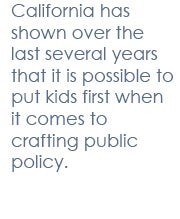
(Photo Credit: istockphoto)
James Steyer is the CEO and Founder of Common Sense Media, a non-partisan organization dedicated to improving media and technology choices for kids and families. We caught up with Steyer, an upcoming presenter at the Aspen Ideas Festival, to learn more about the importance of tech in education.
He’ll be speaking at the Festival on July 2nd, on a panel called “Deep Dive: Is the Internet Taking Us Where We want to Go?”
Since its inception, California has been known for its booms and busts. The national media loves to focus on calamity, disasters that are natural or man-made — drought, recession, earthquakes, fires, floods — the list goes on and on. But the “Paradise Lost” narrative obstructs a greater truth about the current state of the Golden State: California is building a sustainable governance model that prioritizes kids and offers a vision of what 21st Century governance should look like.

While Washington remains bogged down in partisan gridlock and political stalemate, California has shown over the last several years that it is possible to put kids first when it comes to crafting public policy. Lawmakers in California are forging a political path that protects and prioritizes the needs of kids.
It makes sense that the state that is home to so much technological innovation has also led the way ensuring that kids from all socioeconomic backgrounds have schools that are equipped with 21st Century technology. Common Sense Kids Action has worked hard to ensure that as this exciting new technology is adopted into our classrooms, kids and their families can feel secure knowing their personal information will be protected, and that the digital learning environment in their schools is a safe one.
California passed the Student Online Personal Information Protection Act, which prohibits ed-tech vendors from selling student data or repurposing it for any non-educational purpose.
California was also the first state to pass a digital eraser button, requiring websites and apps to allow people younger than 18 to remove their own postings on that website, ensuring that in today’s digital age, a child’s mistakes don’t stay with and haunt them for their entire life.
As California recovers from the Great Recession, leading the state in job creation, its leaders are reinvesting in kids, allocating more money for early childhood development, child care, and transitional kindergarten programs that will ensure every child in the state has a fair start.
The state’s new Local Control Funding Formula, pushed by Gov. Jerry Brown, will direct more money to the schools that need it most, to ensure that English learners and kids from all economic backgrounds have the resources they need in their schools to compete and thrive.
Last year’s state budget included the biggest expansion to early education in a decade, allocating $264 million in new spending for 13,000 new early education — a down payment that state lawmakers are building on this year as the state’s finances continue to improve.
States are often called the laboratories for democracy, places where innovative ideas and new approaches to governance are tested and refined. In California, Common Sense Kids Action is working to advance an agenda that prioritizes kids and provides a model for the nation. As is so often the case when it comes to California, national leaders should take a hard look at what the state is doing right, and use our examples as the foundation for a national kids’ action agenda.

